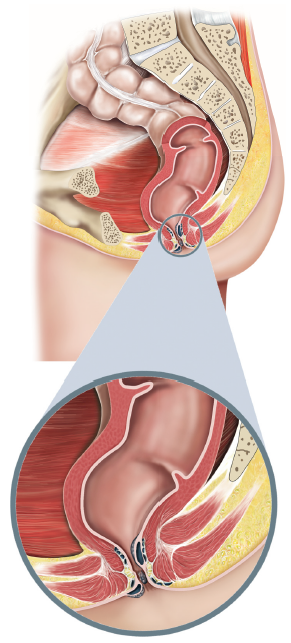What are haemorrhoids?
Haemorrhoids, also known as piles, are soft fleshy lumps just inside your back passage (anus). They bleed easily when you have a bowel movement. They do not usually cause pain but can cause itching. When large, they can pass through your anus (prolapsed pile), feeling like a lump when you clean yourself (see figure 1). Haemorrhoids develop gradually, often over a long period of time. They are associated with constipation, often run in families and can be made worse by pregnancy.
What are the benefits of surgery?
Surgery will remove the haemorrhoids. You should no longer have any of the symptoms that haemorrhoids can cause.
Are there any alternatives to surgery?
Haemorrhoids can often be treated by simple measures, such as drinking more fluid and increasing the amount of fibre in your diet.
If these simple measures are unsuccessful, the haemorrhoids can usually be treated in a clinic. Local treatments include banding or injecting the haemorrhoids.
What does the operation involve?
The operation is usually performed under a general anaesthetic and takes about 20 minutes. Your surgeon will remove your haemorrhoids by either cutting them away or using a staple gun.
What complications can happen?
1. General complications
- Pain
- Bleeding
- Infection of the surgical site (wound)
- Blood clots
2. Specific complications
- Incomplete haemorrhoidectomy
- Difficulty passing urine
- Anal stenosis
- Developing skin tags
- Developing an anal fissure
- Incontinence
How soon will I recover?
You should be able to go home the same day, especially if your haemorrhoids were treated using a staple gun. Drink plenty of fluid and increase the amount of fibre in your diet to avoid constipation.The wounds often take several weeks to heal completely. There are no open wounds with the stapled technique.
Regular exercise should help you to return to normal activities as soon as possible. Before you start exercising, ask the healthcare team or your GP for advice.
You should make a full recovery and the symptoms should clear completely. However, haemorrhoids can come back.
Summary
Haemorrhoids are a common problem. If non-surgical treatments fail, surgery is usually recommended
Acknowledgments
Author: Mr Jonathan Lund DM FRCS (Gen. Surg.), Illustrations: Medical Illustration Copyright © Medical-Artist.com
This document is intended for information purposes only and should not replace advice that your relevant health professional would give you.
